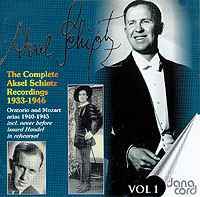The first volume in Danacord’s set of ten devoted to
the art of Aksel Schiøtz and organised by Gerd, his widow, is
devoted mainly to oratorio and opera. Born in 1906 he studied modern
languages at University and gave his first solo song recital (he was
for many years a member of the Copenhagen Male Choir) aged thirty in
1936. His first recordings with his mentor Mogens Wöldike followed
soon after and this disc collates those made between 1940 and 1945,
the year before the tumour operation that ended his career as a tenor.
After 1948 he reappeared as a baritone and devoted himself to extensive
teaching.
His nearest Anglophone equivalent I suppose is Heddle
Nash. Schiøtz had a lyric tenor with a good top, depth at the
lower end of the range, stylistically pure and apt, conscious of performance
practice. He lacked the Englishman’s floated head voice and spinto minstrelsy
but possessed a stronger weight in the lower voice that gave him a splendidly
rounded compass. Indeed he challenges Nash on his own turf in the first
items from Messiah and acquits himself with real distinction. One would
never know that English is not his first language unless one listened
very closely to some minutely unidiomatic vowel sounds but his style
is supple and forward-looking with Wöldike lending lithe and flexible
support. In Comfort ye he sings pardoned in two, not the
three vowels beloved of English tenors. Wöldike’s harpsichordist
is an active presence in Ev’ry Valley and there are excellent
string emphases; he’s deeper in timbre than Nash’s lighter tenor, his
runs excellent. No one for me can touch Walter Widdop in these moments
but Schiøtz matches almost anyone else for beauty of tone and
incisive musicality. The Buxtehude is a ravishing performance; it has
style and simplicity of utterance, a sense of laced delicacy (note the
string players accompanying, members of the Koppel Quartet); the voice
itself is wonderfully well equalized - oddly indeed at some moments
it does take on a baritonal extension prefiguring the tragic calamity
of his brain cancer. In the aria from Bach’s Christmas Oratorio one
can perhaps feel Schiøtz push the voice, particularly in upward
extensions, and he doesn’t sound altogether free in voice production
(though this was a session mate of the Buxtehude and recorded at the
same time).
But the Matthew Passion aria with Morgens Steen Adreassen’s
delightful oboe has great reservoirs of depth and profundity and the
choir, which sounds small, is expertly drilled. The Dowland songs are
accompanied by Jytte Gorki Schmidt’s guitar and are in the elite category
as performances. They have an affecting freshness and modernity, despite
the guitar, and feature sovereign breath control, dynamic shading and
colouristic beauty. In Flow, my teares it is more than instructive
to hear the phrase Down, vain lights sung with such lucid and
incremental hardening of tone. His Mozart arias are imperishable reminders
of his artistry. Dies Bildnis ist bezaubernd schön is most
beautifully phrased, with artless elegance and Dalla sua pace is
characterised with effortless skill – contour, dynamics, the depth and
exquisite control of the lower register – and his Il mio tesoro intanto
has more of his splendid runs and tremendous breath control. My
only disappointment was Un’aura amorosa, which sounds rushed.
Whilst his tone darkens nicely he can’t match Nash in idiomatic ease
here or in sheer vocal plangency. He has real style and a sense of projection
in Lensky’s aria from Eugene Onegin (in Danish) and his Haydn
is full of purity and, once more, stylistic acumen.
The disc is rounded out with a ten-minute rehearsal
segment of two Handel arias - Love sounds the alarm from Acis
and Galatea and Sacred raptures cheer my breast
from Solomon. These post-date by five years his earlier published
Handel from Messiah and here in 1945 the style is a little heavier –
but the former has eloquent runs far superior to the hit and miss latter.
These were with the Royal Philharmonic Orchestra of Stockholm, which
may account for the heavier and more earthbound weight, less like Wöldike’s
more forward looking effect which is itself rather reminiscent of Boyd
Neel’s similarly fluent conducting.
The disc comes with texts and archive material – letters
from the singer and reminiscences of Wöldike and Schiøtz’s
comments on Messiah and Dowland. I hope I’ve conveyed something at least
of Schiøtz’s eloquent musicality; he was without question one
of the very greatest singers of his time and this series pays its own
powerfully eloquent homage to him, not least in Andrew Walter’s magnificent
transfers.
Jonathan Woolf
See also review
by Christopher Howell




